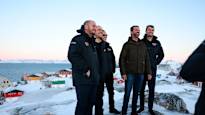NUUK On Wednesday of last week, Greenland was on everyone’s lips, and the news machine was running well-oiled. The plane was the most difficult part of the working day. There are limited connections to Greenland, but I almost got the last ticket for the next day’s flight to Nuuk.
The cameraman couldn’t fit on board, because everyone wanted to go to Greenland Donald Trump Jr after.
They sat next to me on the flight of the Financial Times and a German TV channel Welt’s press corps. They too had been sent on their way with short notice.
I began to prepare for the fact that I would not be welcome in Nuuk. Often, when a small town is filled with journalists, the locals start to get annoyed – and for good reason. Reporters are competing for the same interviewees, and wander around the city looking for a perspective on their story.
A couple of days after in Nuuk, I realized that it was the opposite. Many Greenlanders considered Trump’s speeches gibberish, but were happy that Greenland was finally interested.
This is Donald Trump’s a superpower that few others have: he pointed to an island, and suddenly the whole world is looking here.
Thanks to Trump’s – or the Trumps’ – many news from Greenland that were overshadowed are now on the air: the desire for independence, the dark sides of Danish rule, such as forced contraception for women, growing tourism and the island’s distinctiveness.
There is also a world political side to the matter, from which the whole of Europe benefits.
Topping can to say that the Donald Trumps did Europe a favor.
The increasing importance of the Arctic region has been talked about for more than a decade, but in the end it has been a matter of a small circle. The Finnish media has consistently reported on the Arctic. The focus of stories with beautiful pictures has been in the future. I have written such myself.
The driving force in these stories is usually climate change. As the ice melts, the Arctic region will shift to the center of shipping. When the ice melts, minerals can be mined. When the ice melts, it’s easier to search for oil. As with many issues related to climate change, we are left waiting for the future.
However, the Russian war of aggression also changed the situation in the Arctic.
The future is here and now, and just like everything else after 2022, war and its fear are emphasized in the Arctic equation.
To the greatest extent, this also applies to Finland, which is an arctic state. Program director of the Foreign Policy Institute Harri Mikkola assessed to over the weekend that Finland’s Arctic know-how would also require a new awakening.
The reason for the US the worry can be solved by looking at the globe instead of the two-dimensional map. The distance between Russia and the United States shortens considerably when looking north from above.
That way, Russia could fire long-range missiles from the Kola Peninsula via the shortest route over Greenland to the United States. This is also the reason why the United States already has a military base in Greenland. However, the island’s airspace is poorly controlled.
We can’t get inside Donald Trump’s head, but maybe he too has been studying maps instead of, or in addition to, dreaming of the riches of Greenland.
Denmark has promised more money for Greenland’s defense, but many people living on the island think it is not enough. Denmark too defense secretary Troels Lund Poulsen admitted the matter last week. He said Denmark had neglected Greenland’s defense for years.
Hudson Institute investigator Liselotte Odgaard evaluate In his Politico magazine articlethat Europe and the United States are waking up behind what China and Russia are doing in the Arctic region.
China has been interested in the Arctic for years, even though China is not an Arctic country. Russia is China’s key to icy waters, and as the war of aggression in Ukraine has shown, China will not rise up against Russia as long as it benefits from the relationship between the two countries.
After Russia’s major invasion, Arctic cooperation has been paralyzed because there are no negotiations with Russia. Now the cooperation is partially re-tuned so that one evil does not lead to another. Climate change is still a threat to the Arctic.
Russia’s own work in the region also continues. It has renovated its Arctic bases, some of which are located near the Finnish border.
The situation is illustrated by the fact that all other Arctic countries are now NATO countries. There is a possible collision line in the north, and it’s time to get a good look at it.
Trump’s speeches about buying Greenland were brash and partly scary, but they turned attention in the right direction.
